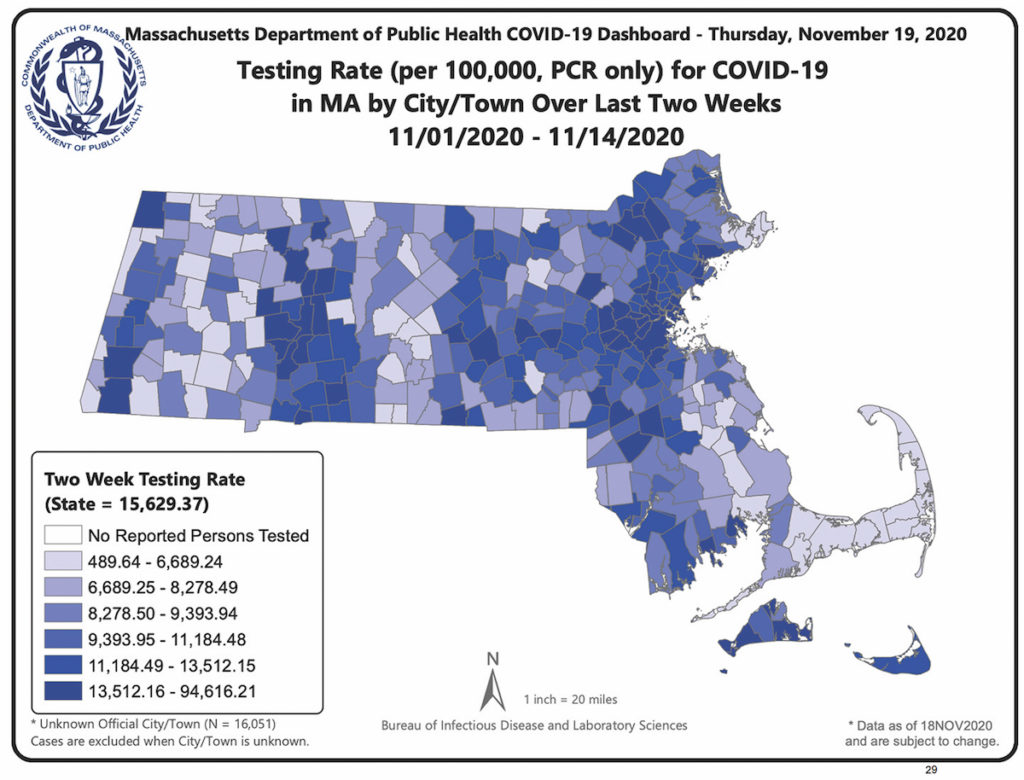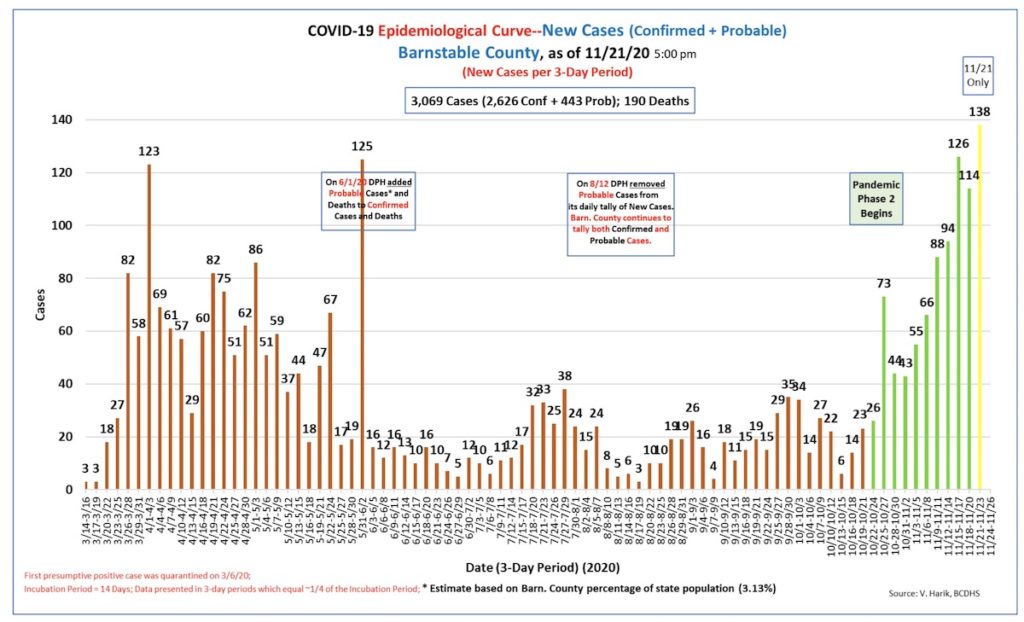
PROVINCETOWN — Resources are arriving to expand Covid testing on Cape Cod — at about the same time as the coronavirus itself is arriving.
The timing wasn’t exactly planned, but it’s not a coincidence, either. Resources have been directed at the worst outbreaks statewide, and, for many months, the Cape has seen comparatively few cases. Now, with infections raging just across the canal and surging in the Mid Cape, leaders are working to get testing that matches the urgency of the moment.
“We are in a testing desert here on Cape Cod,” said state Rep. Sarah Peake of Provincetown. “I think we are missing a lot of people who should be tested. We are working united as a Cape delegation to shine a spotlight on our needs, so we don’t have to see the administration staging a press conference to talk about all their successes … while rural areas like ours are seemingly not on the radar.”
For weeks now, legislators have been calling for Gov. Charlie Baker to release $550,000 for testing on Cape Cod that was authorized in July.
“The Baker-Polito administration has not taken the initiative here,” said state Sen. Julian Cyr of Truro. “When Cape Codders wonder why they can’t get low-barrier testing, that is in part because of slow action by the administration. The state DPH does hundreds of millions in contracts a year. Frankly, these dollars weren’t released until we loudly complained in the press about it.”
Technically, the money is still en route. “We have just received the contracts for the first $300,000,” confirmed Sean O’Brien, director of Barnstable County’s health department. “That earmark has a geographic clause in it — the testing has to be conducted in Falmouth.” Contracts for the remaining $250,000 should follow shortly, and that money can be used for testing anywhere on the Cape, said Cyr.
The state senate just approved another $200,000 for testing on Cape Cod, added Cyr, but that bill is not yet signed into law.
A testing site in Falmouth will come first, said O’Brien, probably by the first weekend in December, followed quickly by locations in the Mid and Outer Cape, and potentially a mobile testing site as well.
OCHS Will ‘Move Quickly’
According to Pat Nadle, CEO of Outer Cape Health Services, “OCHS will be in partnership with [the county], and as the money is acquired, we will start to roll out asymptomatic testing at both our Provincetown and Wellfleet sites. The good news is it looks like that second pack of money will be available, and when that happens, we will move quickly.
“There’s a sliding fee schedule that the county is working on,” added Nadle. “We haven’t seen it yet. But we agree it’s important — there are access and equity issues.”
A molecular Covid test costs about $150 — but that’s a lot more money for some people than it is for others. A sliding fee scale would be pegged to a person’s income; some people are asked to pay full price, others pay half price, and others might not pay at all.
The Community Health Center of Cape Cod, which serves the Upper Cape, recently began an asymptomatic testing program with a sliding scale. Nantucket’s asymptomatic testing program, CastNet, relied almost entirely on self-pay and employer-pay options, with town resources paying for only 10 percent of tests.
“We don’t want to go through this money and then be done,” said O’Brien. “We want to keep this sustainable for the next six months.”
Another way to stretch resources is to bill insurance. “We’re going to talk directly to the state about what’s feasible,” said O’Brien. “How many times will they let you bill? Will they even let you bill the first time? Those are things we have to have answers to.”
Peake has proposed requiring insurers to pay for asymptomatic testing for frontline workers — but her amendment is attached to a bill that’s in conference committee, and its fate may not be known until the legislative session ends on Jan. 5.
In the meantime, Peake wants the state to step in and open one or two “Stop the Spread” sites on Cape Cod. Stop the Spread is the state’s fully funded asymptomatic testing program, which is deployed to communities with high rates of Covid.
“We are putting on the full-court press with the administration to get at least one Stop the Spread site here,” said Peake. “Those are no questions asked, no appointment needed, just show up.
“The other component of Stop the Spread is everything goes to the Broad Institute labs in Cambridge, and they turn around results in 24 to 30 hours,” Peake added. “At CVS in the Mid Cape, you can’t even get an appointment for three days. And then it takes three to five days for a result. That’s eight days of either being an asymptomatic spreader, or actually coming down with the disease. Or quarantining and being worried about your housemates.”
Mid Cape Deteriorates
“Meanwhile, Barnstable town turned red today on the spreadsheet,” Peake said.
Indeed, the situation on the Mid Cape has deteriorated rapidly. In the first three weeks of November, 702 new cases have been discovered in Barnstable county. That is one quarter of all the cases that have ever been found here. The daily new-case record wasn’t just broken — it was doubled.
Ninety percent of the new cases diagnosed in the first two weeks of November were in six towns: Bourne, Sandwich, Mashpee, Falmouth, Yarmouth, and, most of all, Barnstable.
Wellfleet found five cases in those two weeks, Eastham four, and Truro and Provincetown none.
Finding none and having none aren’t the same thing, however. Provincetown’s Health Dept. sent out a notice last week, saying, “Although our known case numbers are low, wastewater test results indicate that some people in town are carrying the virus.” Provincetown’s wastewater is tested twice a week, and a recent spike in the data suggests there are active cases that haven’t been found.
“This is why we need a Stop the Spread site,” said Peake. “I want to be clear: Outer Cape Health Services has all the best intentions, and all the right protocols. The state needs to come in and support their efforts.”




